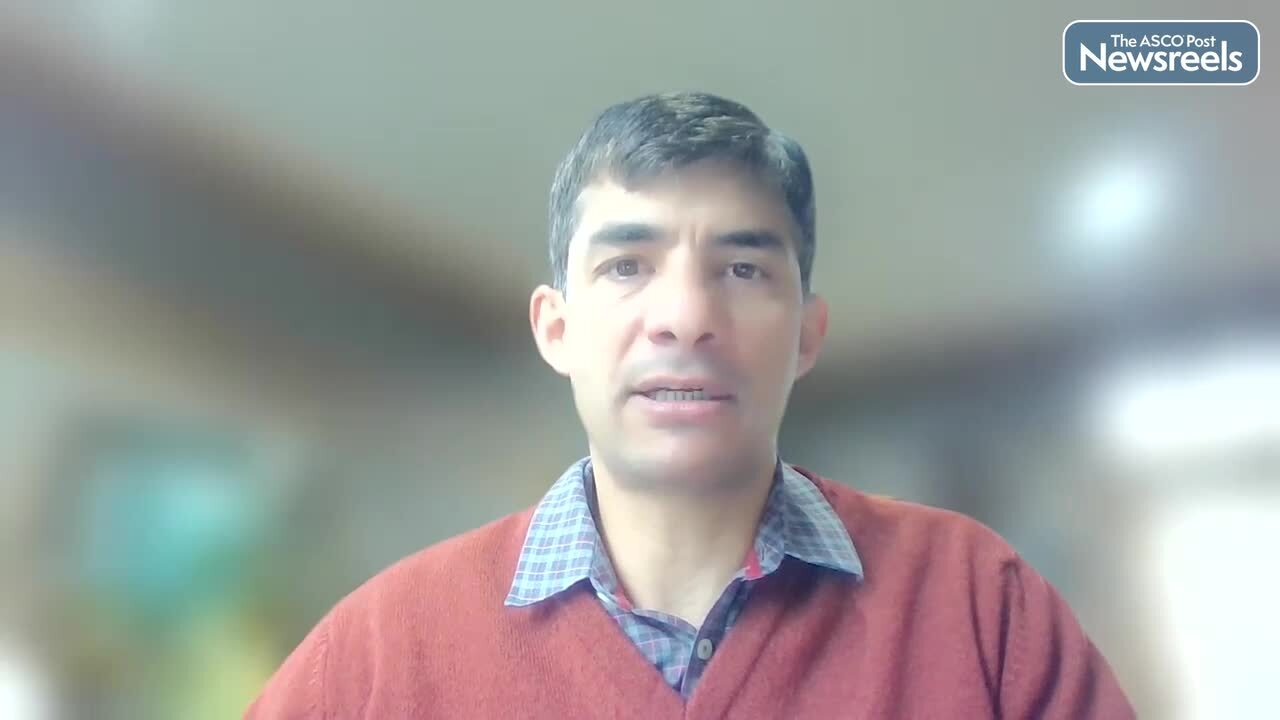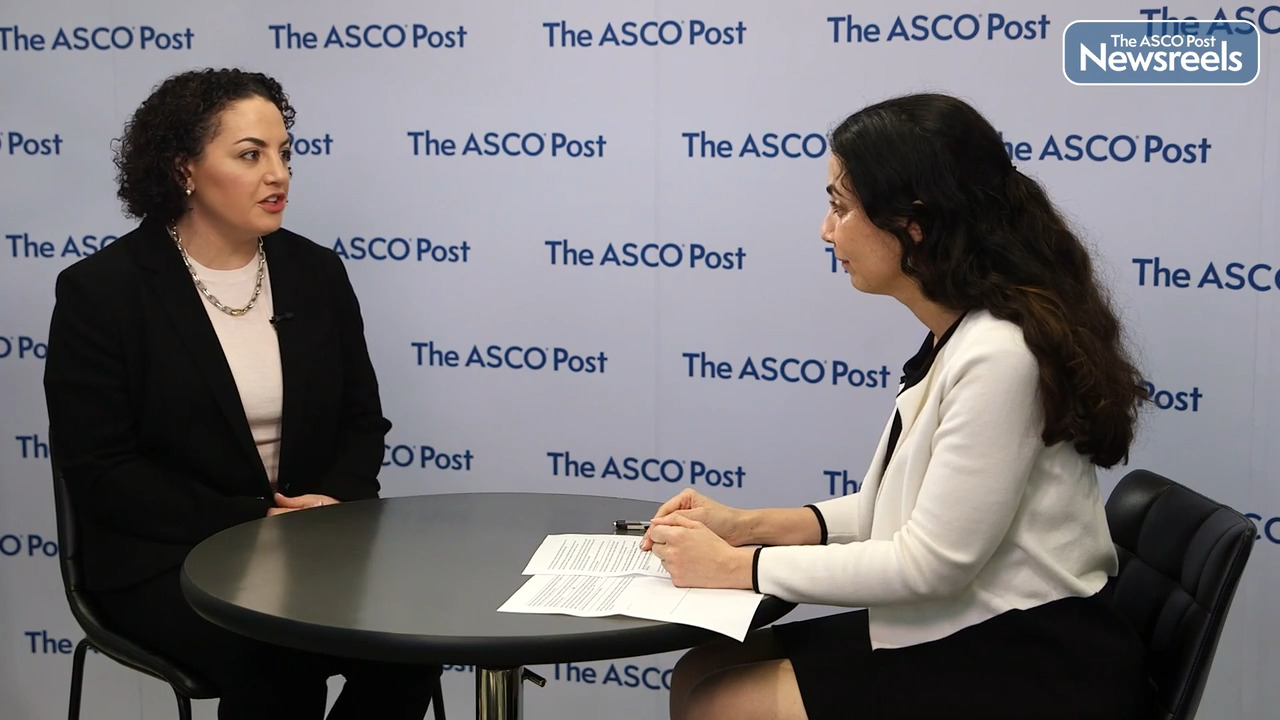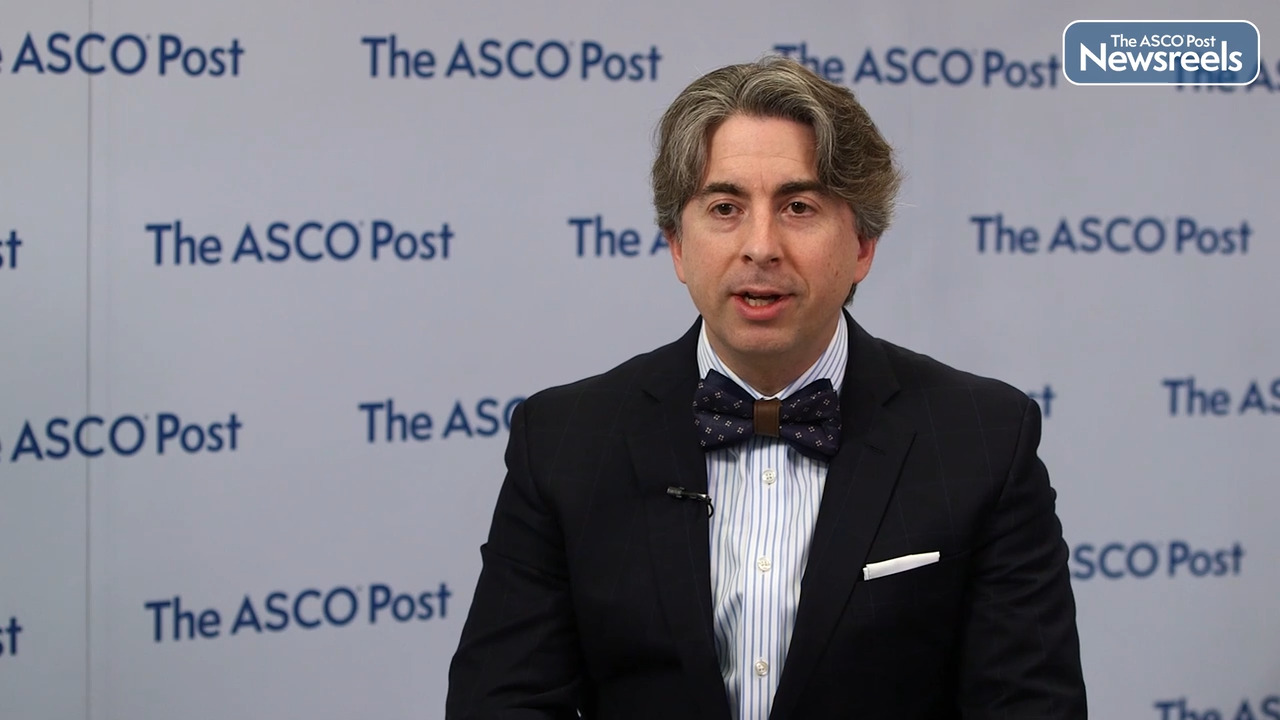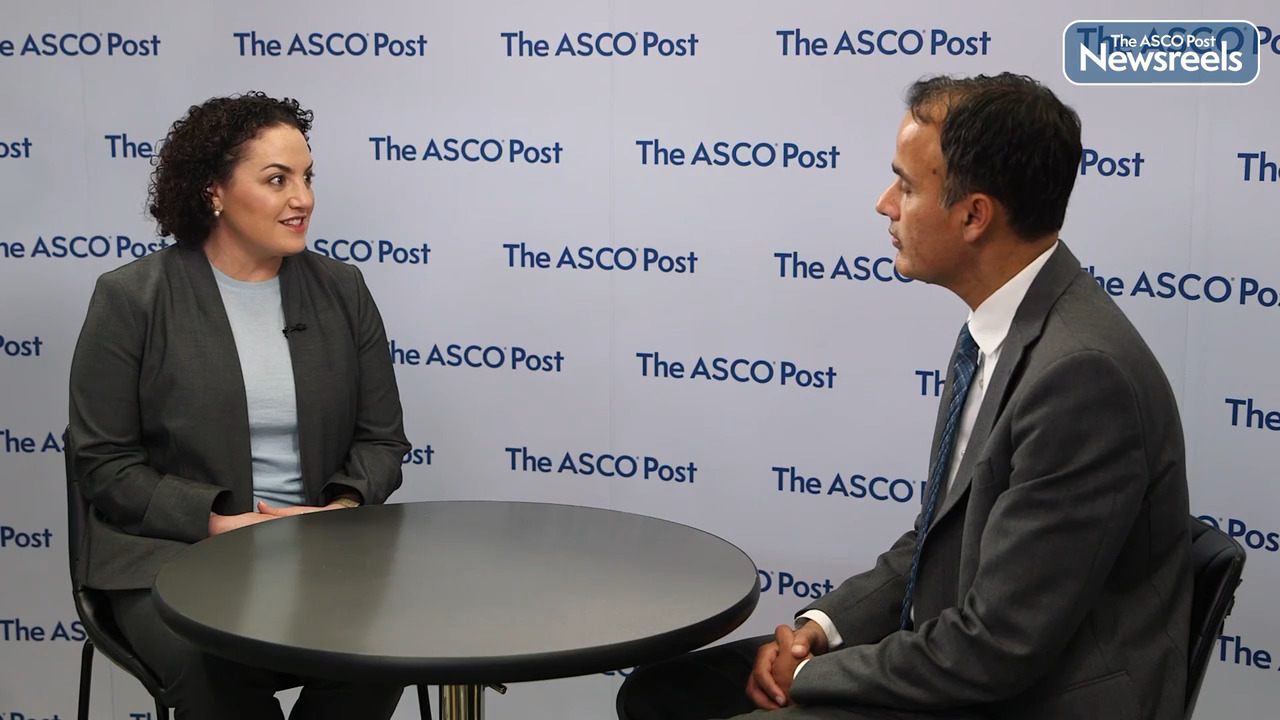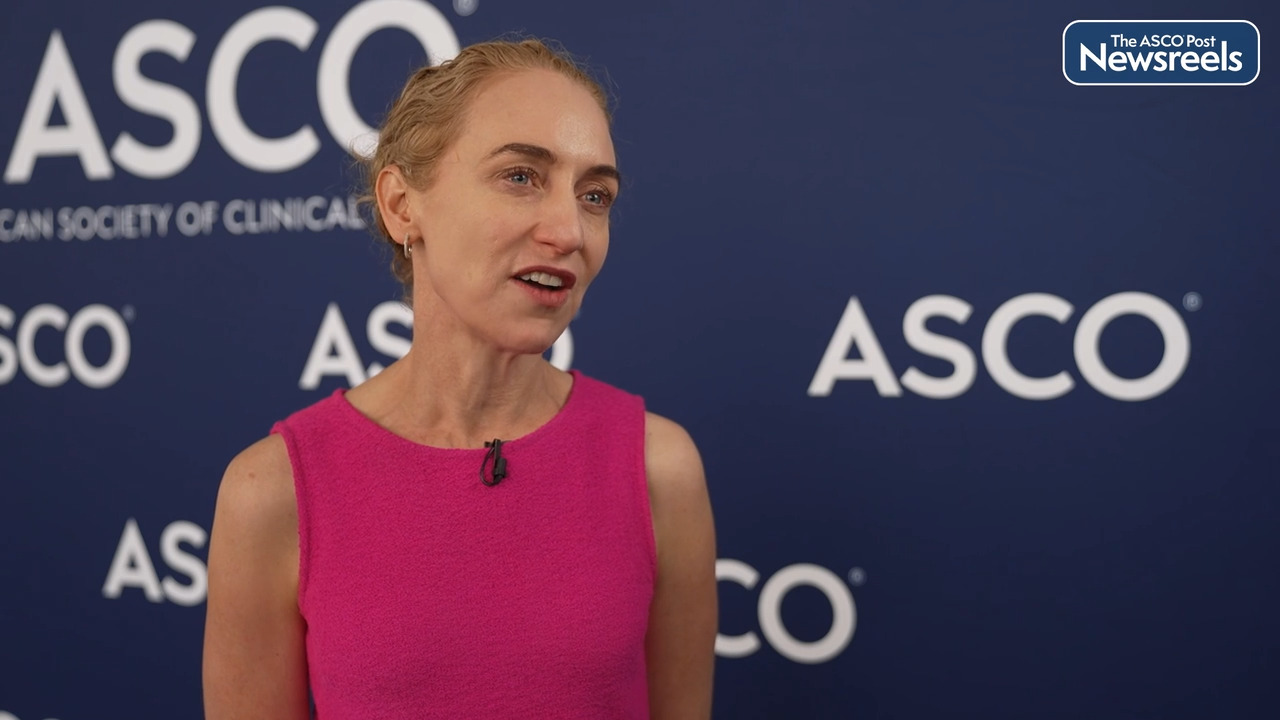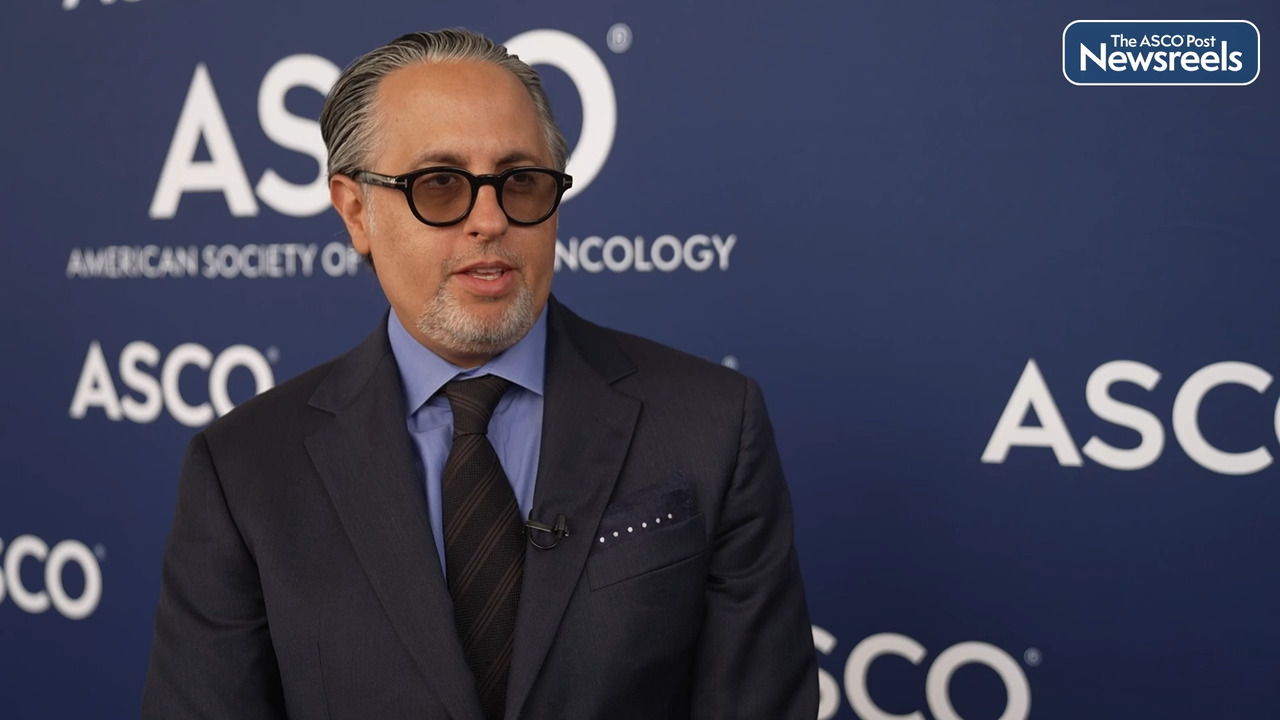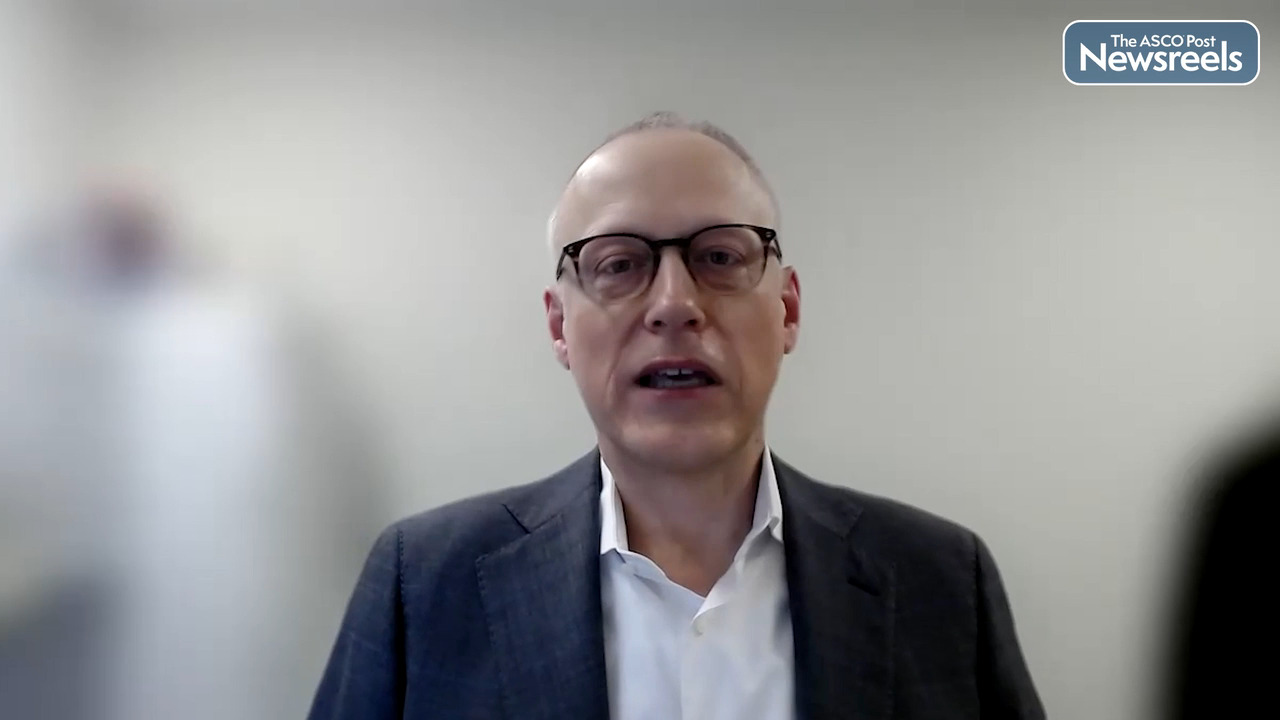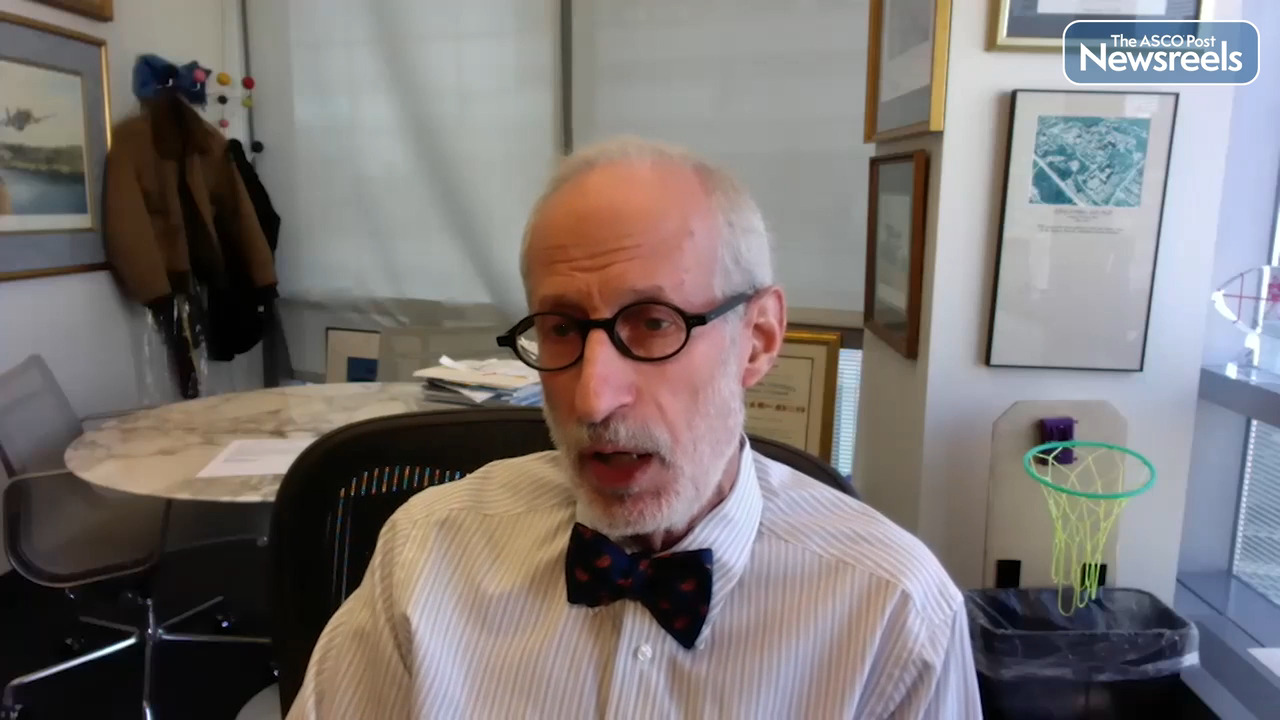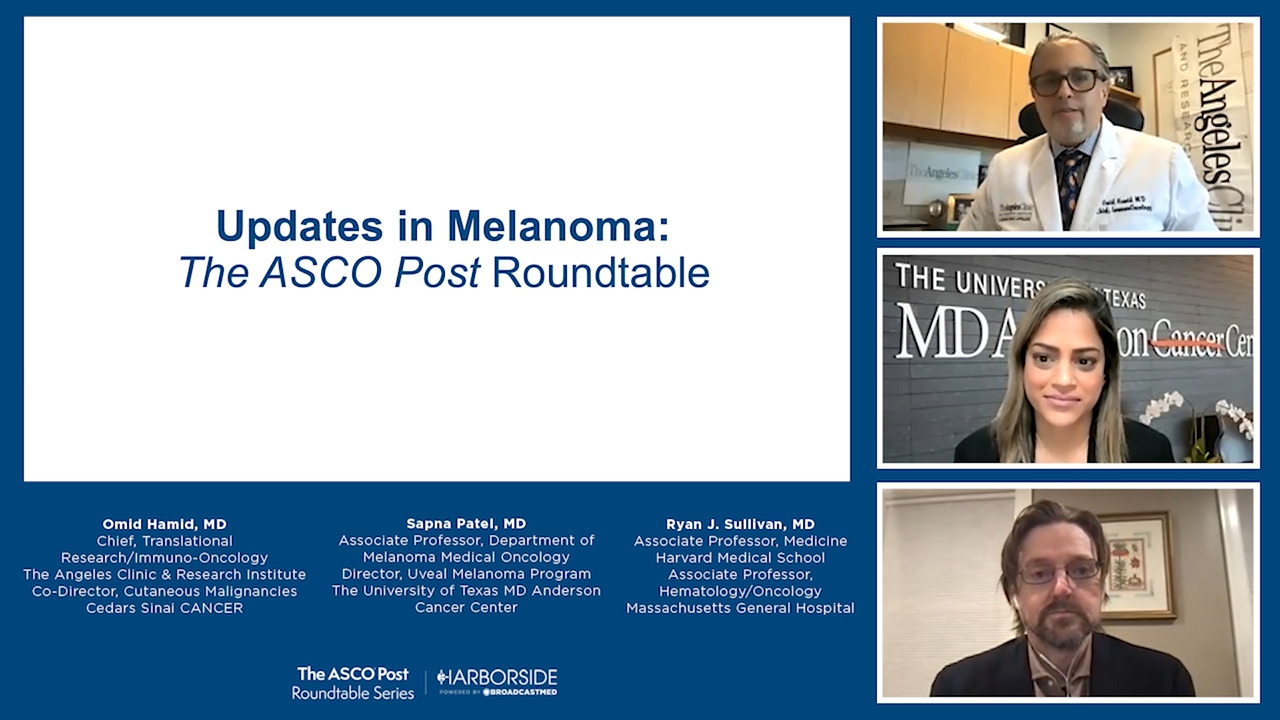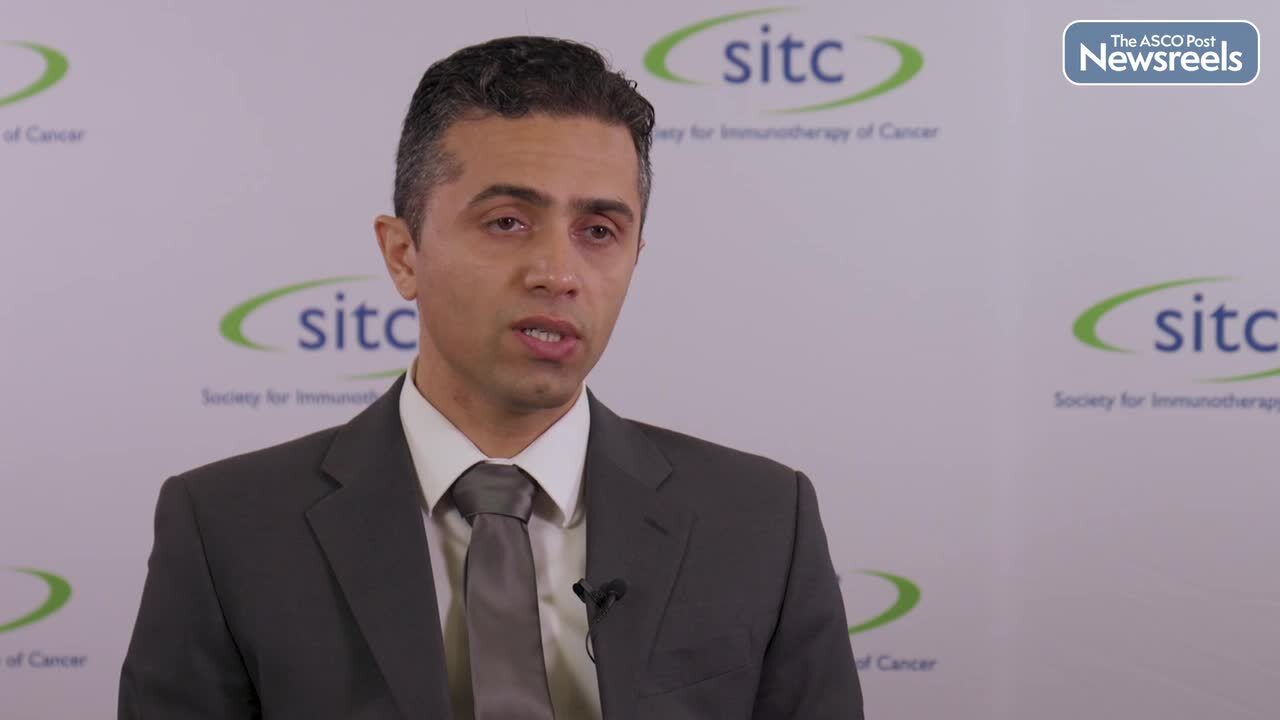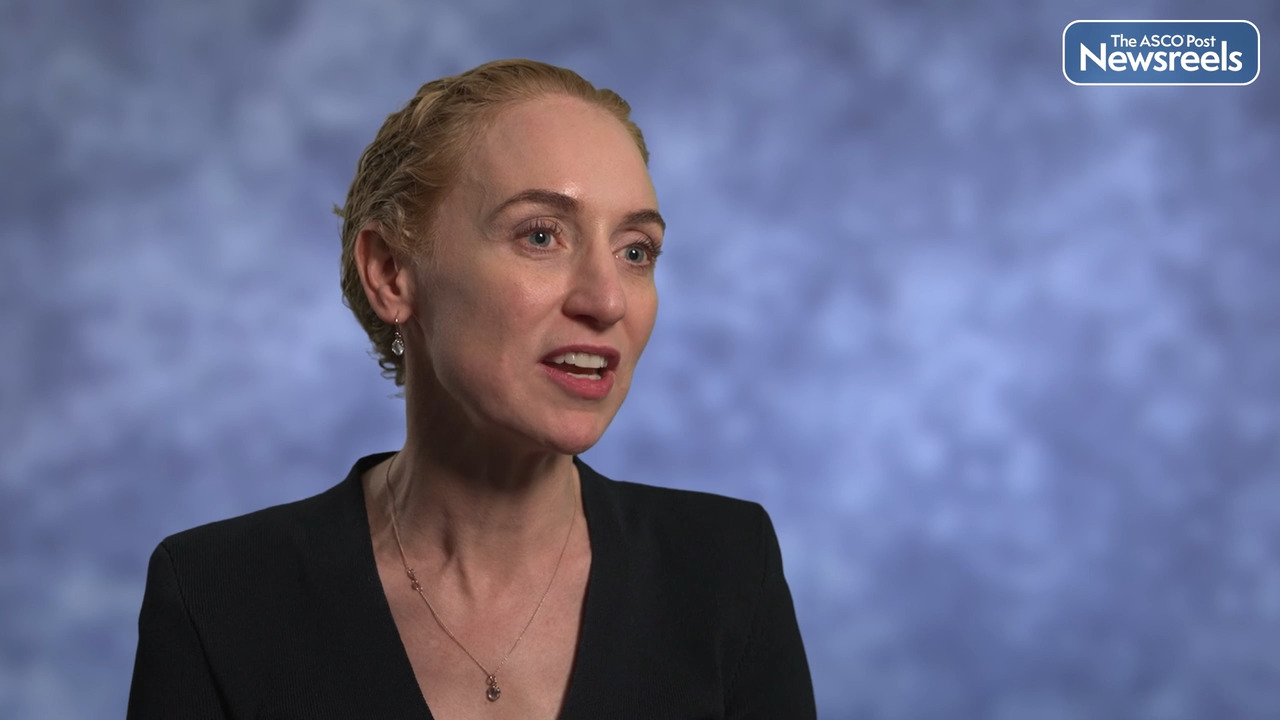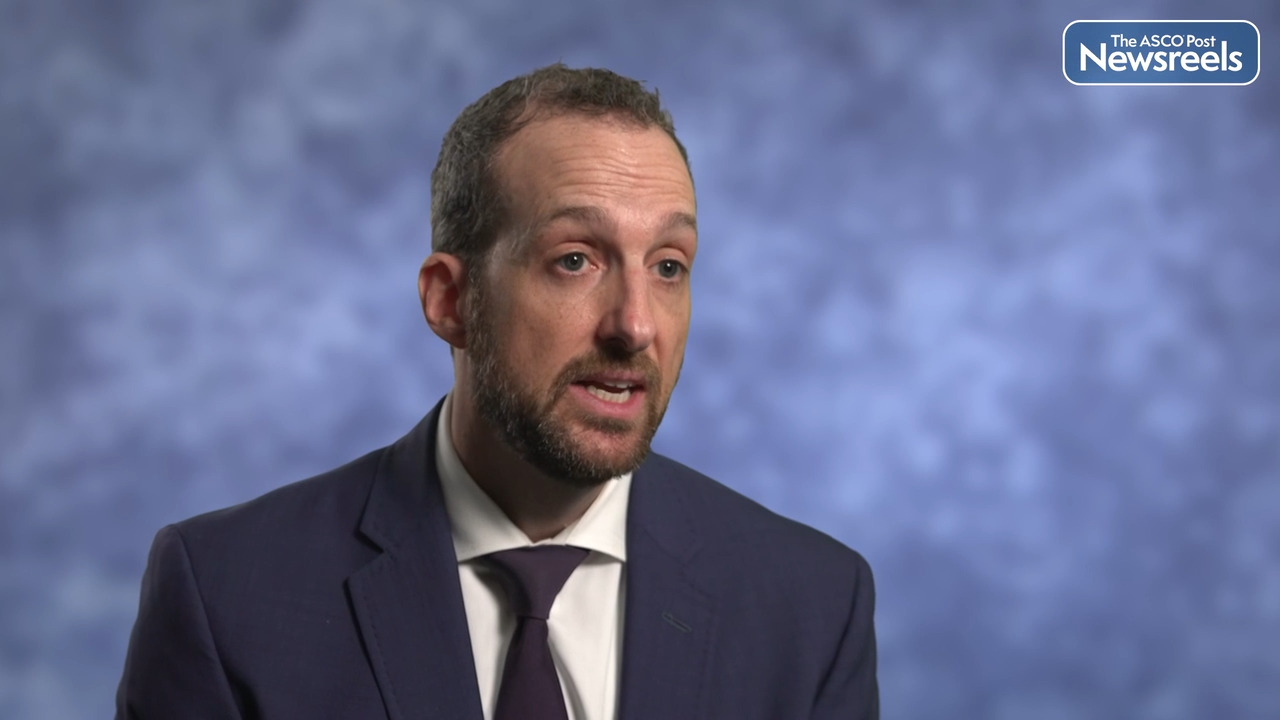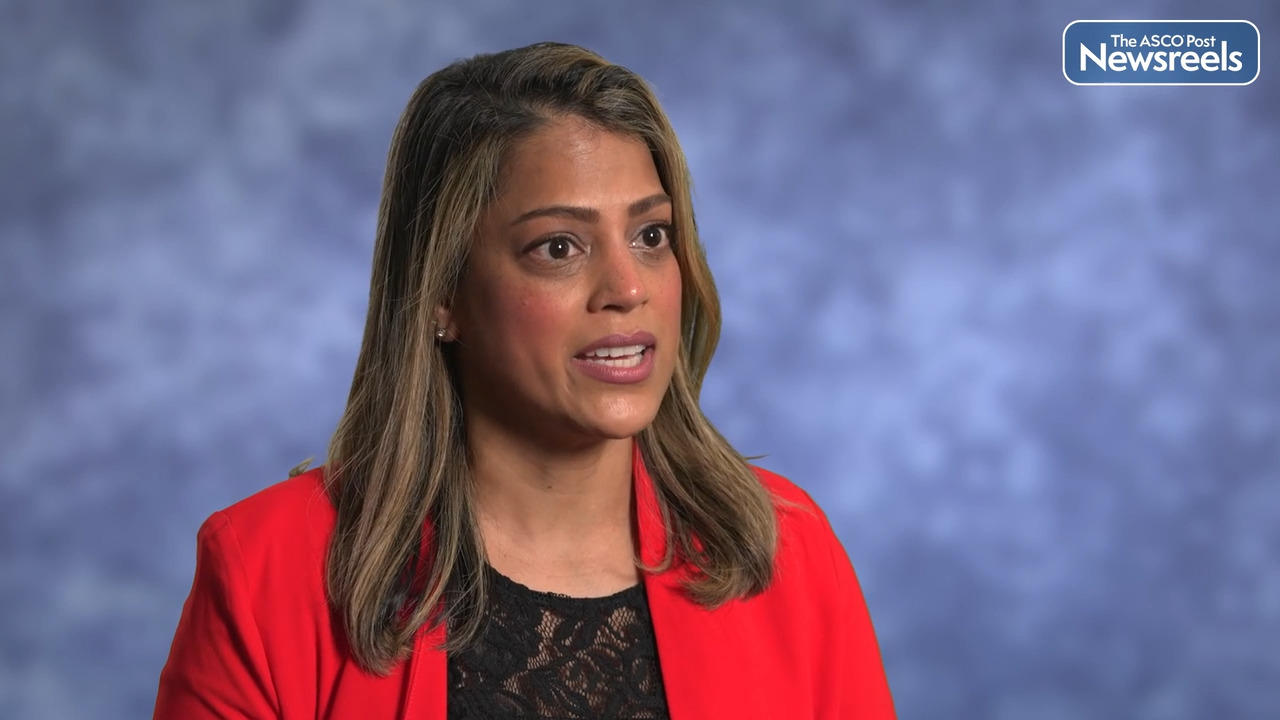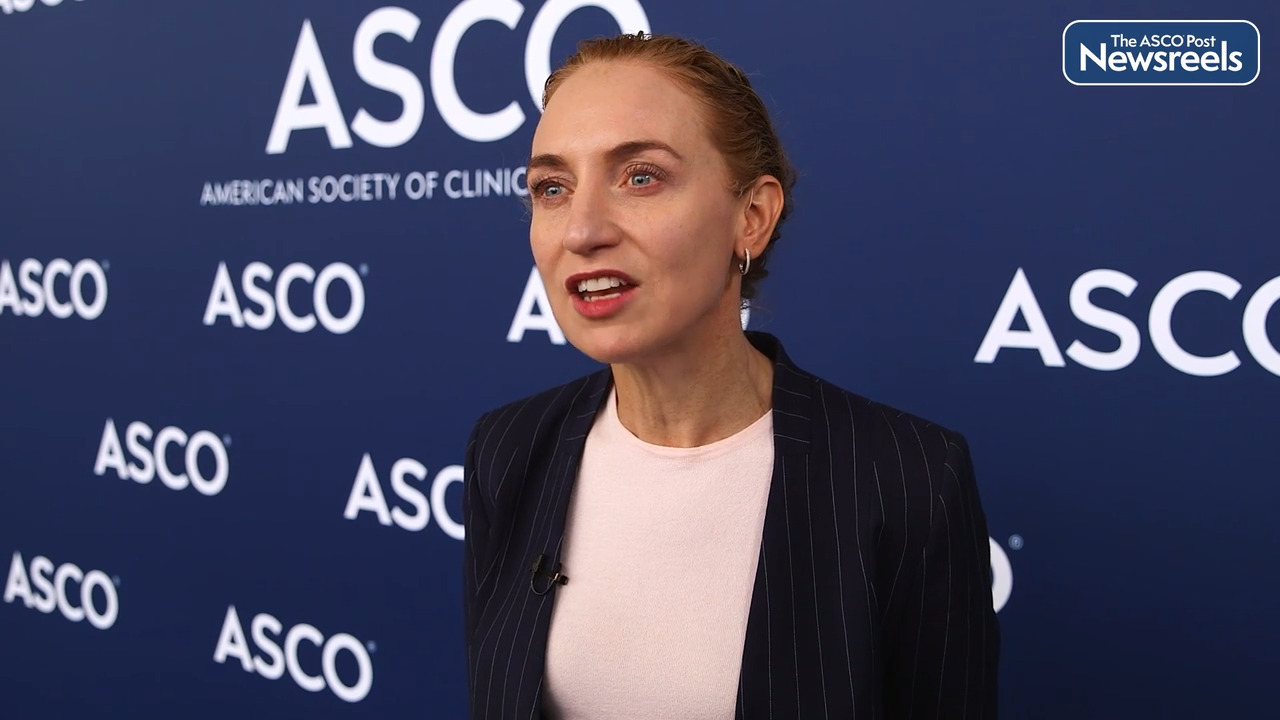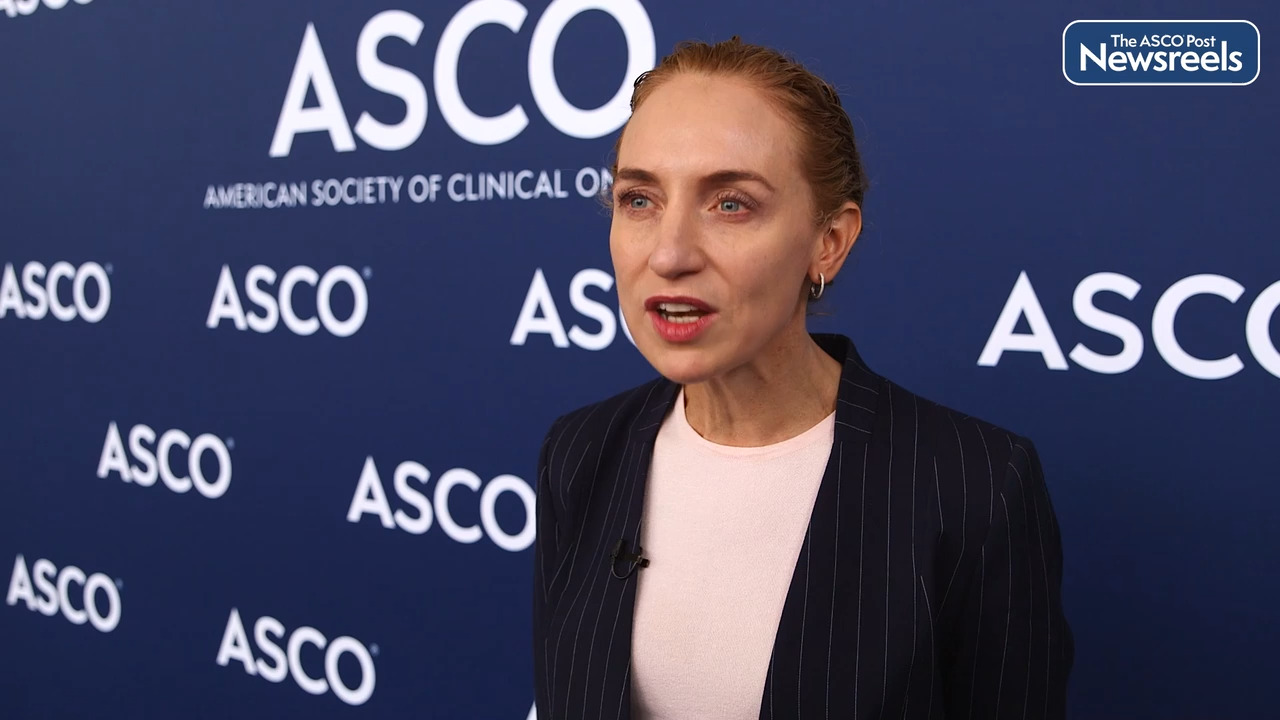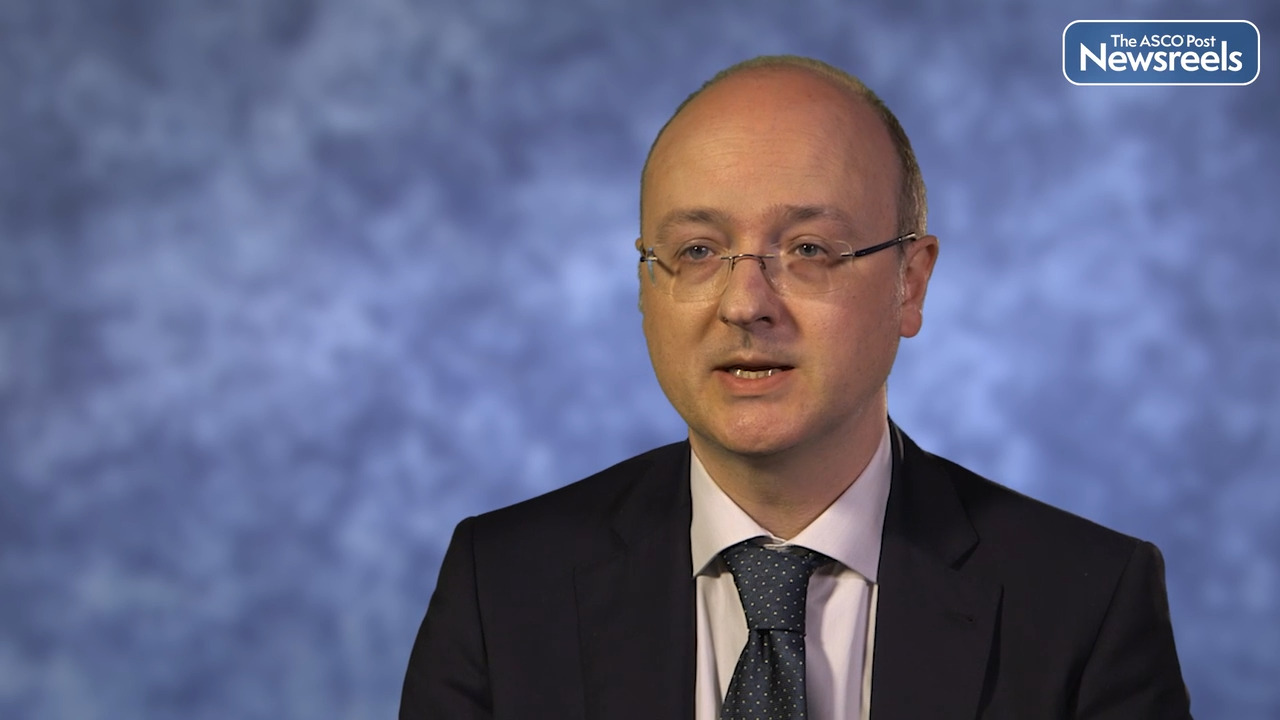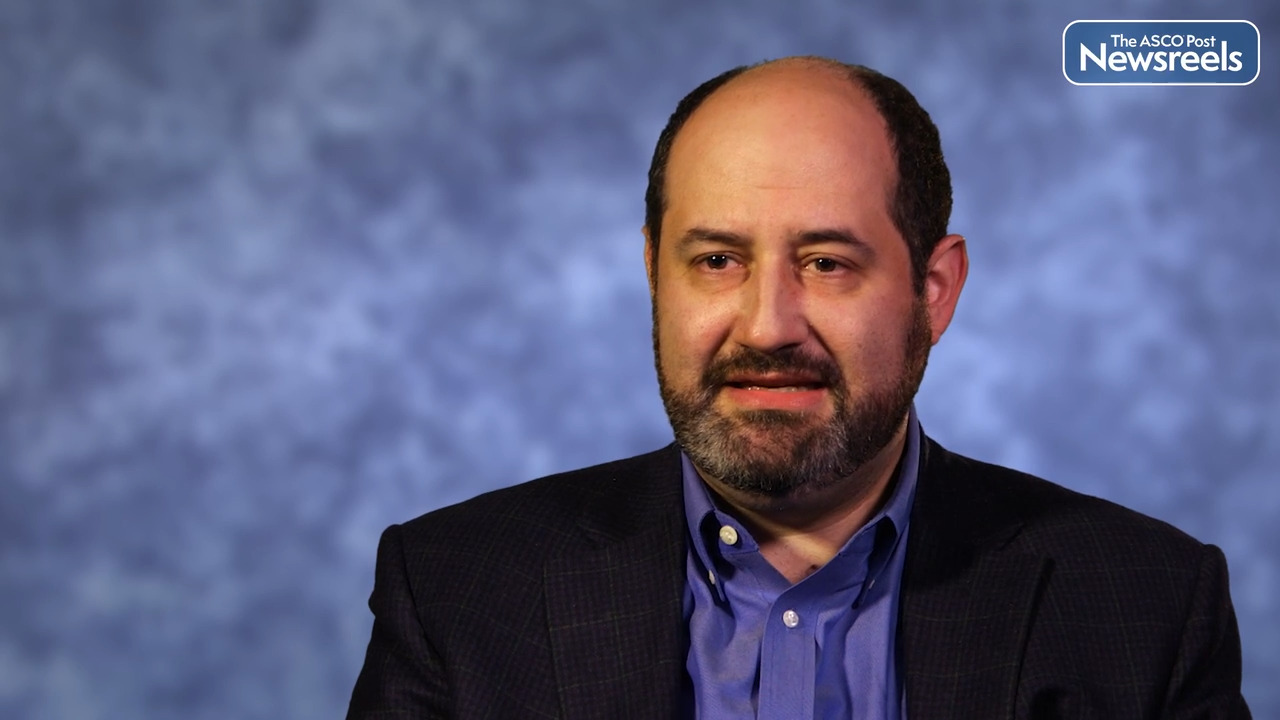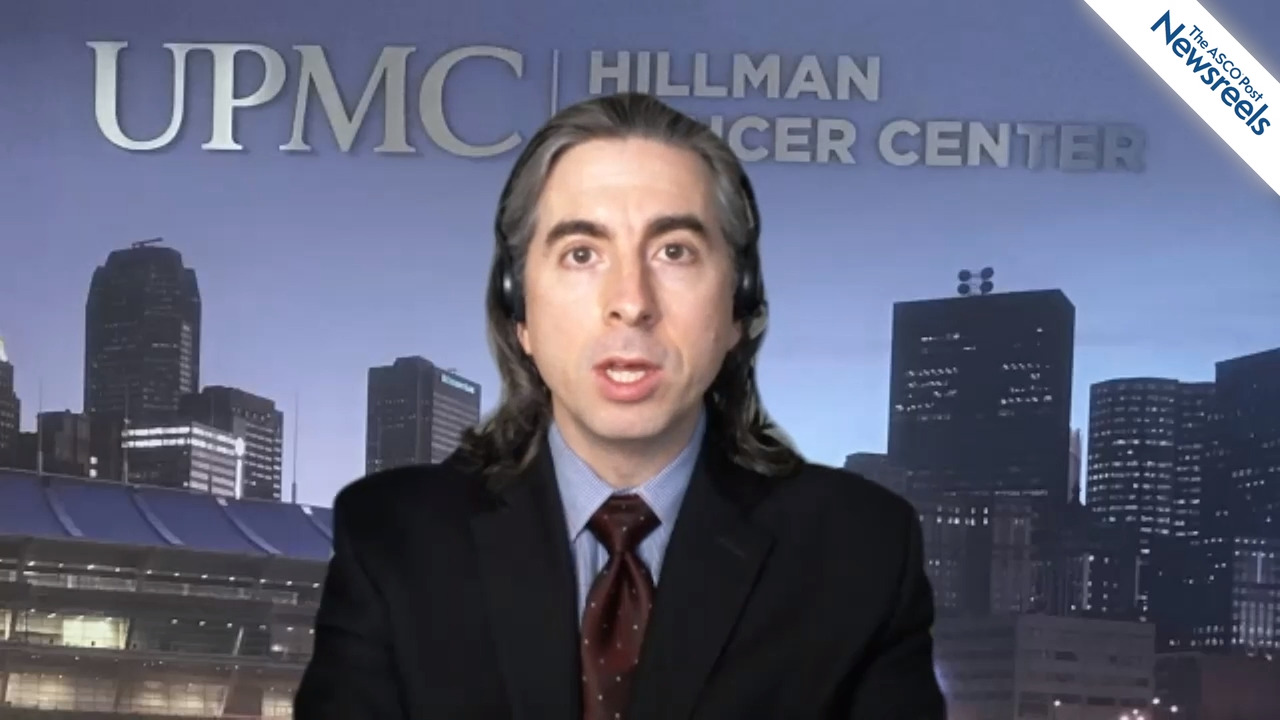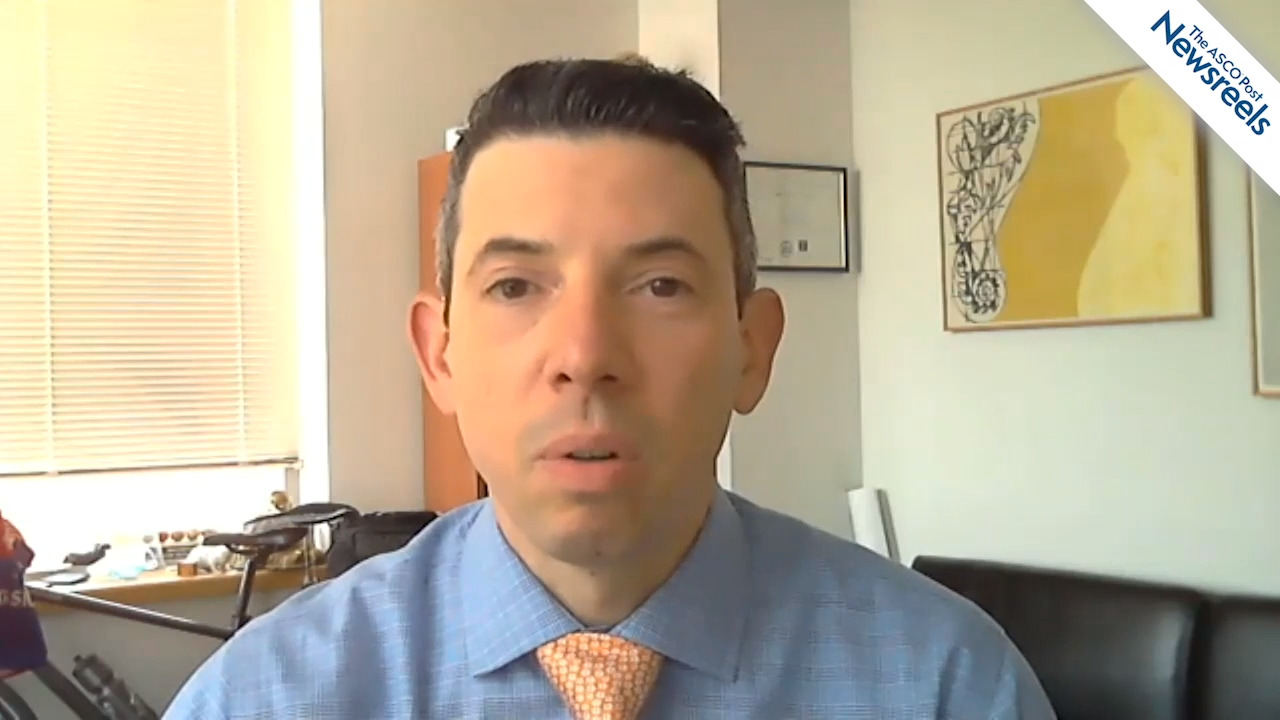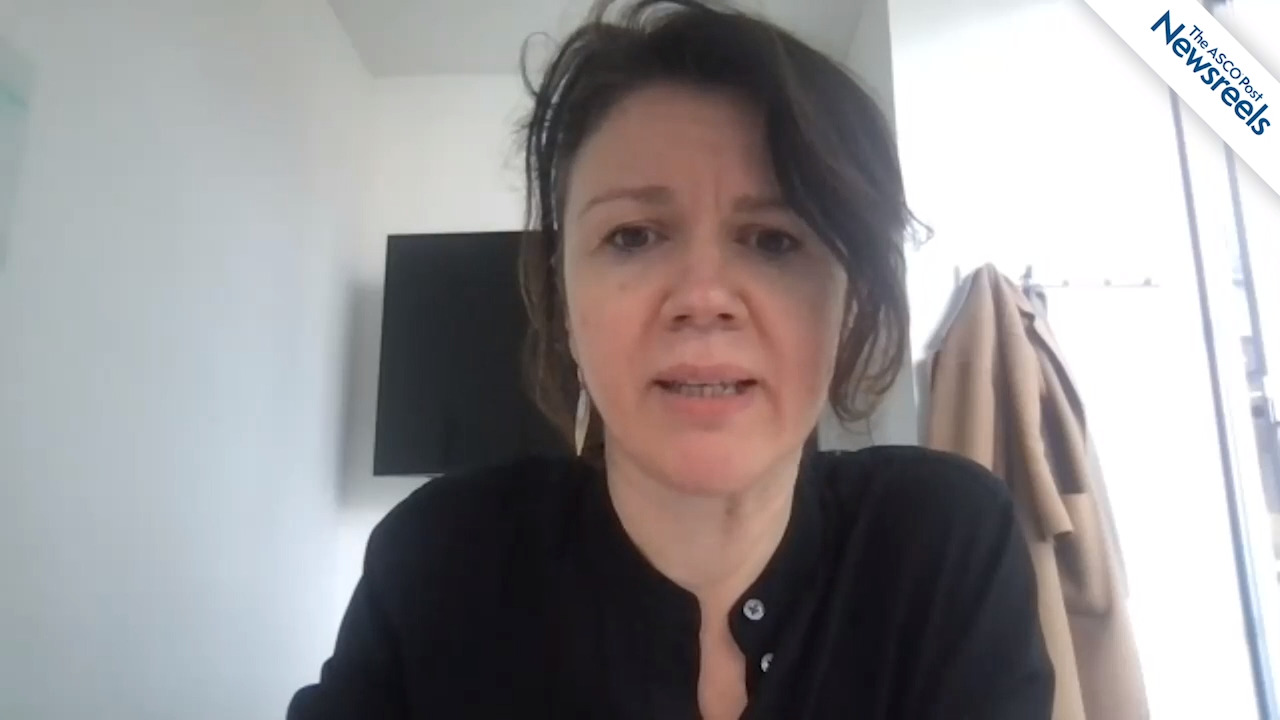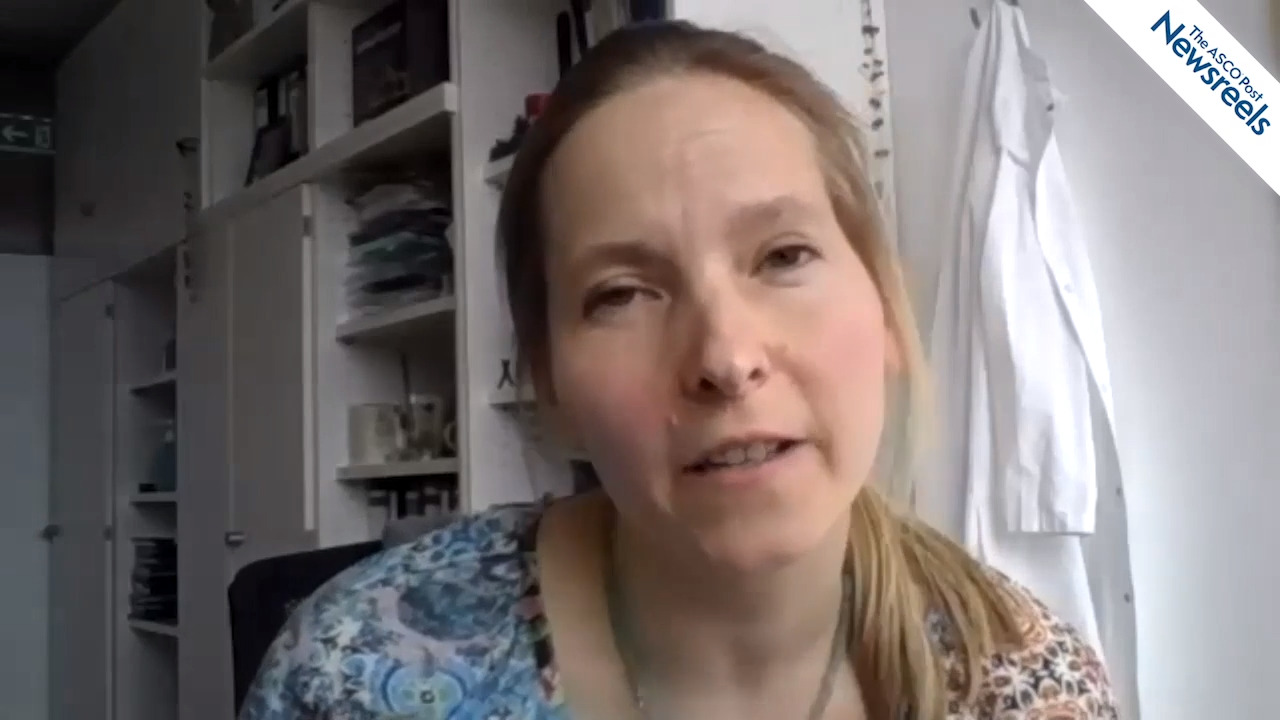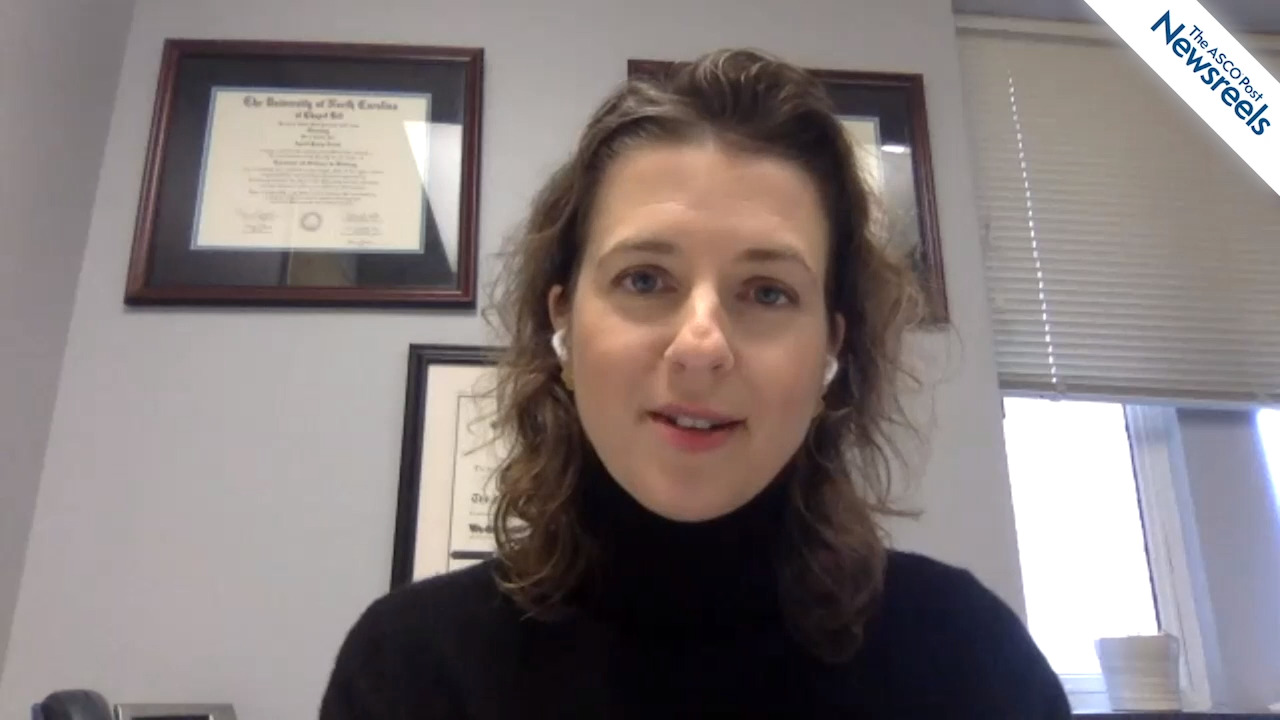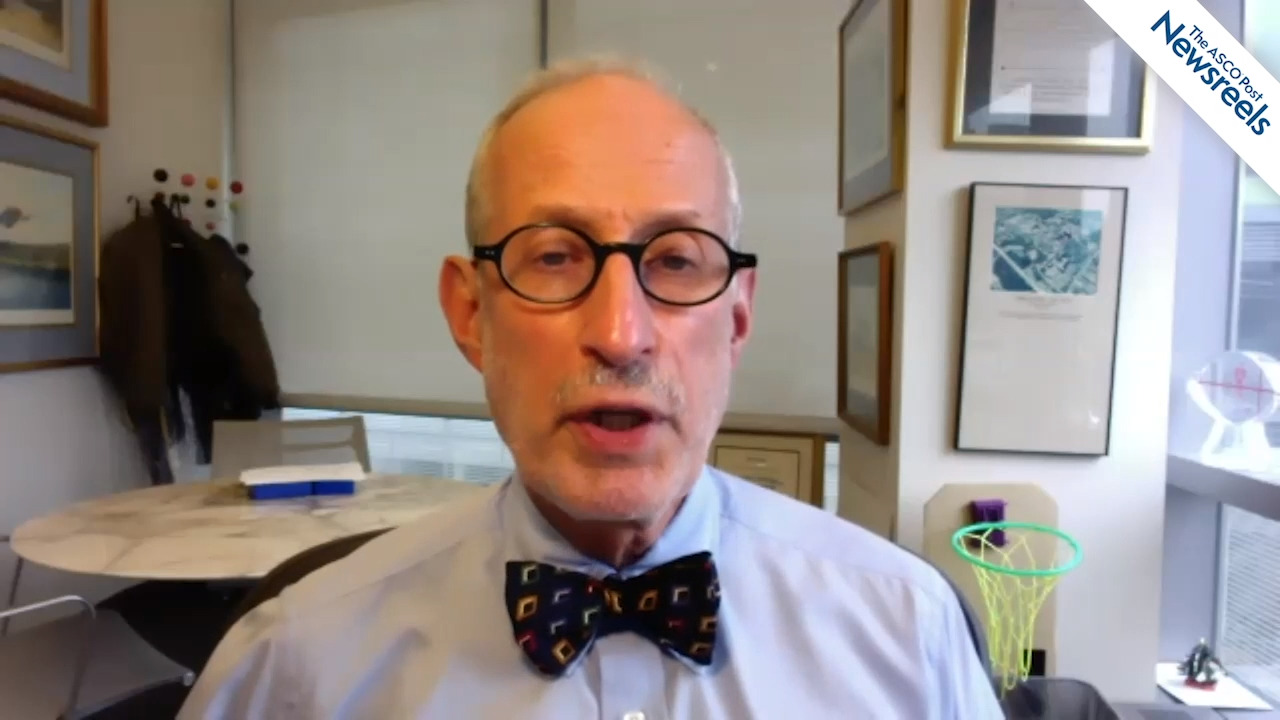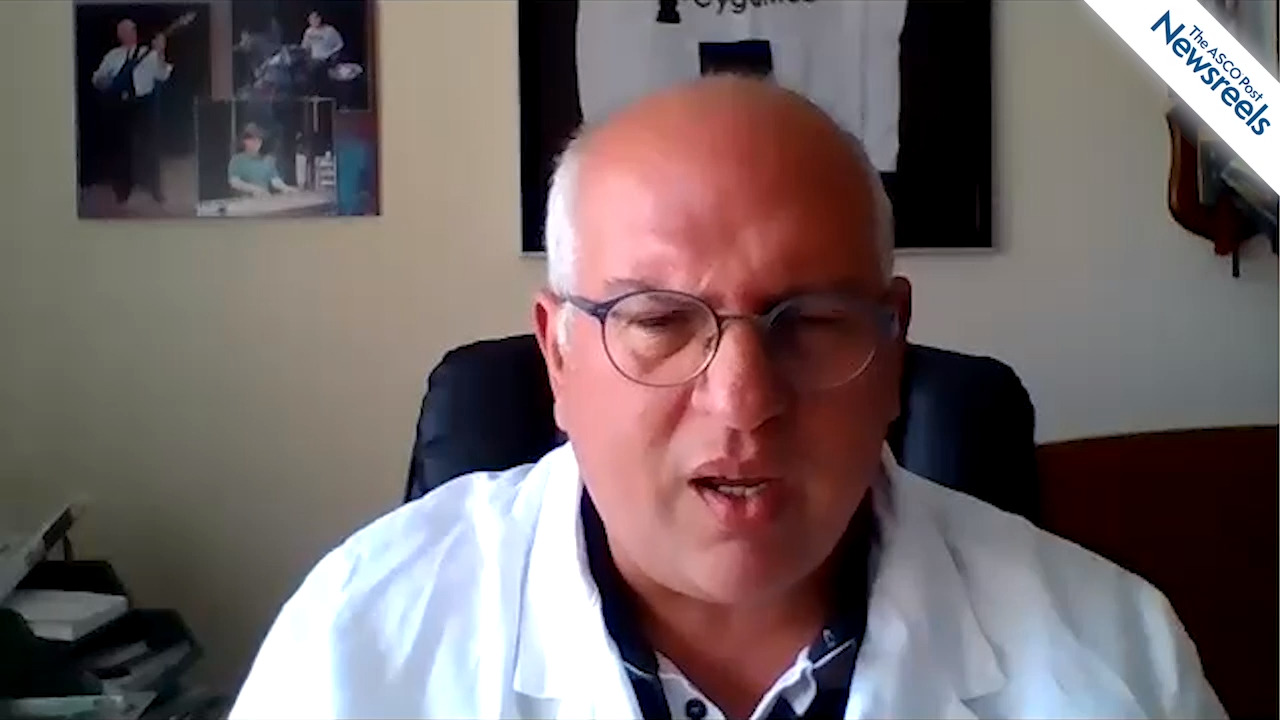Nikhil Khushalani, MD, on Neoadjuvant and Adjuvant Treatment in CSCC
Nikhil Khushalani, MD, Vice Chair for the Department of Cutaneous Oncology at Moffitt Cancer Center, reviews advances in the adjuvant and neoadjuvant treatment of cutaneous squamous cell carcinoma (CSCC). He discusses the possibility of de-escalating therapy for patients who respond positively to presurgical agents; how to best select postoperative regimens; and ongoing trials in both spaces. References Gross ND, Miller DM, Khushalani NI, et al: Neoadjuvant cemiplimab for stage II to IV cutaneous squamous-cell carcinoma. N Eng J Med 387:1557-1568, 2022. Gross ND, Miller DM, Khushalani NI, et al: Neoadjuvant cemiplimab and surgery for stage II-IV cutaneous squamous-cell carcinoma: Follow-up and survival outcomes of a single-arm, multicentre, phase 2 study. Lancet Oncol 11:1196-1205, 2023. Breukers SE, Traets JJH, van Dijk SW, et al: Neoadjuvant ipilimumab and nivolumab in resectable cutaneous squamous cell carcinoma: A randomized phase 2 trial. Nature Medicine. October 8, 2025 (early release online). Ladwa R, Lee JH, McGrath M, et al: Response-adapted surgical and radiotherapy de-escalation in resectable cutaneous squamous cell cancer using pembrolizumab: The De-Squamate study. J Clin Oncol 26:2888-2986, 2025. Porceddu SV, Bressel M, Poulsen MG, et al: Postoperative concurrent chemoradiotherapy versus postoperative radiotherapy in high-risk cutaneous squamous cell carcinoma of the head and neck: The randomized phase III TROG 05.01 trial. J Clin Oncol 13:1275-1283, 2018. Rischin D, Porceddu S, Day F, et al: Adjuvant cemiplimab or placebo in high-risk cutaneous squamous-cell carcinoma. N Eng J Med 393:774-785, 2025. Koyfman SA, Lee JHJ, Mortier L, et al: Phase 3 randomized trial (KEYNOTE-630) of adjuvant pembrolizumab versus placebo for high-risk locally advanced cutaneous squamous cell carcinoma following surgery and radiation. 2025 ASCO Annual Meeting. Abstract 6000. Presented May 31, 2025.
Nikhil Khushalani, MD, on Immunotherapy in Advanced Unresectable CSCC
Nikhil Khushalani, MD, Vice Chair for the Department of Cutaneous Oncology at Moffitt Cancer Center, offers his thoughts on the role of immunotherapy in the treatment of advanced cutaneous squamous cell carcinoma (CSCC). Dr. Khushalani discusses the three currently approved immunotherapeutic agents for this disease—cemiplimab-rwlc, pembrolizumab, and cosibelimab-ipdl—and their confirmatory trials as well as adverse event profiles. He also talks about choosing optimal treatment strategies for patients, and studies currently exploring monotherapy vs combination therapy regimens. References 1. Migden MR, Rischin D, Schmults CD, et al: PD-1 blockade with cemiplimab in advanced cutaneous squamous-cell carcinoma. N Eng J Med 379:341-351, 2018. 2. Hughes BGM, Guminski A, Bowyer S, et al: A phase 2 open-label study of cemiplimab in patients with advanced cutaneous squamous cell carcinoma (EMPOWER-CSCC-1): Final long-term analysis of groups 1, 2, and 3, and primary analysis of fixed-dose treatment group 6. J Am Acad Dermatol 1:68-77, 2025. 3. Grob JJ, Gonzalez R, Bassett-Seguin N, et al: Pembrolizumab monotherapy for recurrent or metastatic cutaneous squamous cell carcinoma: A single-arm phase II trial (KEYNOTE-629). J Clin Oncol 25:2916-2925, 2020. 4. Maubec E, Boubaya M, Petrow P, et al: Phase II study of pembrolizumab as first-line, single-drug therapy for patients with unresectable cutaneous squamous cell carcinomas. J Clin Oncol 26:3051-3061, 2020. 5. Clingan P, Ladwa R, Brungs D, et al: Efficacy and safety of cosibelimab, an anti-PD-L1 antibody, in metastatic cutaneous squamous cell carcinoma. J Immunother Cancer 10:e007637, 2023. 6. Zandberg DP, Allred JB, Rosenberg AJ, et al: Phase II (Alliance A091802) randomized trial of avelumab plus cetuximab versus avelumab alone in advanced cutaneous squamous cell carcinoma. J Clin Oncol 43:2398-2408, 2025.
Allison Betof Warner, MD, PhD, on TIL Therapy for Advanced Melanoma: Innovative Clinical Advances in Treatment
Allison Betof Warner, MD, PhD, reviews important clinical research in the treatment of advanced melanoma, including tumor-infiltrating lymphocyte (TIL) therapy, the role of this innovative treatment in advanced melanoma, and relevant data, peer-reviewed literature, and FDA approvals in 2024. She also provides a look ahead at what is on the horizon in 2025 with regard to care for patients with advanced melanoma.
Georgina V. Long, MD, PhD, on BRAF-Mutated Melanoma: Long-Term Follow-up of Adjuvant Dabrafenib Plus Trametinib vs Placebo
Georgina V. Long, MD, PhD, of the Melanoma Institute Australia and The University of Sydney, discusses final results with up to 10 years’ follow-up data of the COMBI-AD study of patients with stage III BRAF-mutated melanoma who received adjuvant dabrafenib plus trametinib (Abstract 9500).
Omid Hamid, MD, on Cutaneous Melanoma: Update on a Bispecific Protein Under Study
Omid Hamid, MD, of The Angeles Clinic and Research Institute, a Cedars-Sinai affiliate, discusses updated data on IMC-F106C, a novel bispecific protein that, in a phase I safety and efficacy study, exhibited clinical activity in patients with unresectable or metastatic cutaneous melanoma who were pretreated with immune checkpoint inhibitors. A phase III trial of IMC-F106C with nivolumab in the first-line setting of metastatic disease has been initiated (NCT06112314; Abstract 9507).
Axel Hauschild, MD, on Melanoma: Findings From the PIVOTAL Trial of Daromun vs Surgery
Axel Hauschild, MD, of Germany’s University of Kiel and University Hospital Schleswig-Holstein, discusses phase III study results on neoadjuvant intralesional daromun vs immediate surgery for patients with fully resectable, locally advanced melanoma (Abstract LBA9501).
Pauline Funchain, MD and Paolo A. Ascierto, MD, on Advanced Melanoma: Results From the RELATIVITY-048 Trial
Pauline Funchain, MD, of Stanford University and the Stanford Cancer Institute, and Paolo A. Ascierto, MD, of Italy’s Istituto Nazionale Tumori and IRCCS Fondazione G. Pascale, discuss efficacy and safety findings of the triplet therapy nivolumab, relatlimab-rmbw, and ipilimumab in patients with advanced melanoma (Abstract 9504).
Pauline Funchain, MD, and Caroline Robert, MD, PhD, on Melanoma: New Data on Encorafenib, Binimetinib, Ipilimumab, and Nivolumab
Pauline Funchain, MD, of Stanford University, and Caroline Robert, MD, PhD, of Gustave Roussy, discuss phase II findings showing that combining encorafenib and binimetinib followed by ipilimumab and nivolumab vs ipilimumab and nivolumab can improve progression-free survival in patients with BRAF-V600E/K-mutated melanoma characterized by high lactate dehydrogenase and liver metastases (Abstract LBA9503).
Christian U. Blank, MD, PhD, on Melanoma: Potentially Practice-Changing Results From the NADINA Trial
Christian U. Blank, MD, PhD, of the Netherlands Cancer Institute, discusses findings of an investigator-initiated phase III trial showing that neoadjuvant ipilimumab plus nivolumab followed by response-driven adjuvant treatment improved event-free survival in patients with macroscopic, resectable stage III melanoma compared with adjuvant nivolumab (LBA2)
Douglas B. Johnson, MD, MSCI, on Cutaneous Melanoma: Treatment Updates
Douglas B. Johnson, MD, MSCI, of Vanderbilt-Ingram Cancer Center, discusses updated guidelines on the use of neoadjuvant therapy, as well as first- and later-line systemic therapies to treat patients with cutaneous melanoma.
Sophia McKinley, MD, EdM, on Cutaneous Melanoma: Outcomes With Adjuvant Immunotherapy
Sophia McKinley, MD, EdM, of Massachusetts General Hospital, discusses patterns of recurrence in patients with resected cutaneous melanoma during or after adjuvant immunotherapy. She identifies the risk factors associated with overall survival and treatment failure (Abstract 60).
Jenny H. Chang, MD, on New Findings on Merkel Cell Carcinoma and Neoadjuvant Immunotherapy
Jenny H. Chang, MD, of the Cleveland Clinic, discusses the current surgical and radiologic treatment paradigm for patients with stage III Merkel cell carcinoma and the potential for neoadjuvant immunotherapy to help manage the disease and regional lymph node metastases (Abstract 67).
Christopher A. Barker, MD, on New Data on Vismodegib and Radiotherapy for Basal Cell Carcinoma of the Head and Neck
Christopher A. Barker, MD, of Memorial Sloan Kettering Cancer Center, discusses phase II study results showing that patients with locally advanced, unresectable basal cell carcinoma of the head and neck experienced improved quality of life after induction and concurrent vismodegib with curative-intent radiation treatment. According to Dr. Barker, the data on this strategy may provide a beneficial benchmark for clinical practice (Abstract 9).
Melanoma in Younger Individuals
This is Part 4 of Evolving Skin Cancer Management, a four-part video roundtable series. Scroll down to watch the other videos from this Roundtable. In this video, Drs. Pauline Funchain, Alison Vidimos, and Lisa Zaba review the case of a 32-year-old patient who recently gave birth to her first child; following childbirth, she noticed a suspicious lesion on her thigh. A biopsy confirms that the lesion is a melanoma, with a Breslow depth of 3 mm. In the conversation that follows, the faculty note the rising incidence of skin cancer in people younger than 40, including melanoma, and also point out skin changes during pregnancy that may warrant surveillance in the perinatal and postnatal periods. They also discuss the debate surrounding the role of prognostic gene expression profiling in this patient population.
Early Detection and Management in Merkel Cell Carcinoma
This is Part 3 of Evolving Skin Cancer Management, a four-part video roundtable series. Scroll down to watch the other videos from this Roundtable. In this video, Drs. Pauline Funchain, Alison Vidimos, and Lisa Zaba discuss the importance of early detection and multidisciplinary treatment of Merkel cell carcinoma. The patient is a 72-year-old male with a history of extensive sun exposure. He presents with a rapidly growing, firm—but painless—1.5 cm nodule on the back of his hand. In the conversation that follows, the faculty emphasize the importance of early detection and timely diagnosis of Merkel cell carcinoma due to its aggressive natural history, rapid growth, and lack of distinguishing clinical features; touch on the multidisciplinary collaboration between dermatology, surgery, and oncology necessary for optimal care; and discuss upcoming data on the role of adjuvant immunotherapy for this malignancy.
Multidisciplinary Management in Cutaneous Squamous Cell Carcinoma
This is Part 2 of Evolving Skin Cancer Management, a four-part video roundtable series. Scroll down to watch the other videos from this Roundtable. In this video, Drs. Pauline Funchain, Alison Vidimos, and Lisa Zaba review how the multidisciplinary team comes together to treat cutaneous squamous cell carcinoma. The patient is a 65-year-old man with a history of long-term sun exposure and has had multiple actinic keratoses. He presents to dermatology with a large, aggressive cutaneous squamous cell carcinoma on his cheek; it is approximately 4 cm. He also has a history of chronic lymphocytic leukemia, for which he is undergoing observation. In the conversation that follows, the faculty discuss how a multidisciplinary team of practitioners may come together to care for this patient, and discuss if and when they would consider treatment options such as surgery, radiation, and systemic therapy.
Nonsurgical Approaches to Basal Cell Carcinoma
This is Part 1 of Evolving Skin Cancer Management, a four-part video roundtable series. Scroll down to watch the other videos from this Roundtable. In this video, Drs. Pauline Funchain, Alison Vidimos, and Lisa Zaba discuss nonsurgical treatment options for basal cell carcinoma. The patient is a 68-year-old female who presents with a 1.5 cm nodular lesion on her nose. A biopsy shows that the lesion is indeed a basal cell carcinoma, with no signs of aggressive growth or invasion. The patient is concerned about undergoing surgery due to the risk of facial scarring and wants to know more about alternative, nonsurgical treatment options. In the conversation that follows, the faculty discuss nonsurgical options for patients with basal cell carcinoma, including photodynamic therapy, laser therapy, topical agents, hedgehog inhibitors, immunotherapy, and more.
Shailender Bhatia, MD, on Merkel Cell Carcinoma: Results From CheckMate 358 on Nivolumab With or Without Ipilimumab
Shailender Bhatia, MD, of the University of Washington and Fred Hutchinson Cancer Center, discusses phase I/II results on the efficacy of nivolumab with or without ipilimumab in patients with recurrent or metastatic Merkel cell carcinoma. The study found that, for this rare and aggressive skin cancer, nivolumab showed clinical activity in advanced disease. However, these results from CheckMate 358 do not suggest an additional benefit with ipilimumab added to nivolumab (Abstract 9506).
Allison Betof Warner, MD, PhD, and Zeynep Eroglu, MD, on Metastatic Melanoma: New Data on Dabrafenib, Trametinib, and Navitoclax
Allison Betof Warner, MD, PhD, of Stanford University Medical Center, and Zeynep Eroglu, MD, of H. Lee Moffitt Cancer Center and Research Institute, discusses phase II findings showing that in patients with BRAF-mutant metastatic melanoma, dabrafenib plus trametinib and navitoclax (DTN) was associated with a complete response rate of 20% and an overall response rate of 84%. Additionally, there was a trend toward improved overall survival in patients treated with DTN compared with dabrafenib plus trametinib alone; the difference in overall survival was more pronounced in patients with a smaller tumor burden (Abstract 9511).
Jason J. Luke, MD, on Melanoma Adjuvant Therapy: Final Analysis of KEYNOTE-716
Jason J. Luke, MD, of the University of Pittsburgh Medical Center Hillman Cancer Center, discusses adjuvant pembrolizumab, which, in previous results, improved distant metastasis– and recurrence-free survival in patients with resected stage IIB or IIC melanoma vs placebo. After a median follow-up of 39.4 months, adjuvant pembrolizumab continued to show a benefit over placebo, with no new safety signals (Abstract LBA9505).
Allison Betof Warner, MD, PhD, and Adnan Khattak, PhD, MBBS, on High-Risk Resected Melanoma: Survival Results With mRNA-4157 and Pembrolizumab in KEYNOTE-942
Allison Betof Warner, MD, PhD, of Stanford University Medical Center, and Adnan Khattak, MBBS, FRACP, PhD, of Australia’s Hollywood Private Hospital & Edith Cowan University, discuss the use of the mRNA-4157 vaccine in combination with pembrolizumab as adjuvant therapy for resected high-risk melanoma, which prolonged distant metastasis–free survival compared with pembrolizumab alone. These results provide further evidence that a personalized neoantigen approach is potentially beneficial (Abstract LBA9503).
Georgina V. Long, MD, PhD, on Resected Melanoma: Biomarkers for and Efficacy of Adjuvant Nivolumab vs Placebo
Georgina V. Long, MD, PhD, of Melanoma Institute Australia and The University of Sydney, discusses new data showing that patients with resected stage IIB/C melanoma who were treated with adjuvant nivolumab had prolonged recurrence-free survival compared with placebo across all biomarker subgroups. The baseline biomarkers most predictive of prolonged recurrence-free survival with nivolumab were high interferon gamma score, high tumor mutational burden, CD8 T-cell infiltration, and low C-reactive protein (Abstract 9504).
Omid Hamid, MD, on Advanced Melanoma: Durable Response With Fianlimab Plus Cemiplimab
Omid Hamid, MD, of The Angeles Clinic & Research Institute, discusses study findings on fianlimab plus cemiplimab-rwlc, which showed clinical activity in patients with advanced melanoma, comparing favorably with other approved combinations of immune checkpoint inhibitors in the same clinical setting. This is the first indication that dual LAG-3 blockade may produce a high level of activity with significant overall response rate after adjuvant anti–PD-1 treatment. A phase III trial of this regimen in treatment-naive patients with advanced melanoma is ongoing (Abstract 9501).
Marcus O. Butler, MD, on Uveal Melanoma: Tebentafusp and Evidence of Tumor Response
Marcus O. Butler, MD, of Toronto’s Princess Margaret Cancer Centre, discusses evidence of tumor response in orbital lesions treated with tebentafusp in patients with metastatic uveal melanoma. Tebentafusp is a first-in-class novel bispecific protein, the first therapy to show superior overall survival compared with standard therapy for metastatic uveal melanoma. Based on these study findings, a role for this agent as a neoadjuvant treatment warrants further investigation. (Abstract LB 118/1)
Jeffrey S. Weber, MD, PhD, on Melanoma: New Data on a Cancer Vaccine Combined With Pembrolizumab
Jeffrey S. Weber, MD, PhD, of the Perlmutter Cancer Center at New York University Langone, discusses efficacy and safety results from the phase II KEYNOTE-942 trial, which showed that a personalized mRNA-based cancer vaccine, combined with the immune checkpoint inhibitor pembrolizumab, improved recurrence-free survival compared with pembrolizumab alone in patients with high-risk melanoma. The clinical benefit was observed regardless of the tumor mutational burden status. (Abstract CT001)
Emerging Second- and Third-Line Therapies for Unresectable and Metastatic Melanoma
This is Part 4 of Updates in Melanoma, a four-part video roundtable series. Scroll down to watch the other videos from this Roundtable. In this video, Drs. Omid Hamid, Sapna Patel, and Ryan Sullivan discuss the second- and third-line therapy options for unresectable and metastatic melanoma. The patient is a 55-year-old man diagnosed with metastatic melanoma that has spread to the lung and liver. He was previously treated with combination checkpoint inhibitor therapy without benefit, and his providers are debating the next steps. The faculty review the recent data in advanced melanoma in the second line and beyond, focusing in particular on tumor-infiltrating lymphocyte (TIL) therapy. They provide an overview of what the practicing clinician and patients should know about TIL therapy, the logistics involved, and recent data.
First-Line Therapy for Metastatic Malignant Melanoma
This is Part 3 of Updates in Melanoma, a four-part video roundtable series. Scroll down to watch the other videos from this Roundtable. In this video, Drs. Omid Hamid, Sapna Patel, and Ryan Sullivan discuss the first-line treatment of metastatic melanoma. The patient is a 32-year-old woman recently diagnosed with BRAF V600E–negative melanoma that has metastasized to the liver. MRI of the brain was negative, her EVOG performance score is 1, and she has no contraindications to targeted therapy or immune checkpoint inhibitors. The faculty review the changing first-line treatment landscape in metastatic and unresectable melanoma, discussing the many immunotherapy combinations that have entered the field. In particular, they highlight the results of the recent RELATIVITY-047, CheckMate 067, and DREAMseq trials.
Neoadjuvant Therapy in Malignant Melanoma
This is Part 2 of Updates in Melanoma, a four-part video roundtable series. Scroll down to watch the other videos from this Roundtable. In this video, Drs. Omid Hamid, Sapna Patel, and Ryan Sullivan discuss current adjuvant treatment options in malignant melanoma. The patient is a 67-year-old man with a long-standing mole on his leg that has begun to change over the past year. A biopsy shows a 2.2-mm melanoma, nonulcerated, and the tumor is BRAF-positive. Physical examination reveals palpable lymphadenopathy in the inguinal area. The faculty discuss the current neoadjuvant armamentarium for malignant melanoma, reviewing the implications of the OpACIN and S1801 trials and highlighting possible ways to deescalate surgery and adjuvant therapy.
Adjuvant Therapy in Malignant Melanoma
This is Part 1 of Updates in Melanoma, a four-part video roundtable series. Scroll down to watch the other videos from this Roundtable. In this video, Drs. Omid Hamid, Sapna Patel, and Ryan Sullivan discuss current adjuvant treatment options in malignant melanoma. The patient is a 67-year-old man with a long-standing mole on his leg that has begun to change over the past year. A biopsy shows a 2.2-mm melanoma, nonulcerated, with no palpable lymph nodes in the inguinal area. CT and PET scans show no evidence of metastatic disease, sentinel lymph nodes are negative, and the tumor is BRAF-positive. The faculty discuss the role of immunotherapy in the adjuvant treatment of stage II-IV melanoma, highlighting recent trials such as COMBI-AD, CheckMate 238, and KEYNOTE-54. In addition, they emphasize the importance of testing for BRAF status when making treatment decisions.
Saman Maleki, PhD, on Melanoma: Reducing Primary Resistance to Immunotherapy
Saman Maleki, PhD, of Canada’s Western University and Lawson Health Research Institute, discusses modifying the gut microbiome in patients with advanced melanoma to induce a response to anti–PD-1 therapy and potentially reduce primary resistance to immunotherapy. A fecal microbiota transplant from healthy donors before treatment appears to be beneficial (Abstract 614).
John B.A.G. Haanen, MD, PhD, on Melanoma: Phase III Data on Treatment With Tumor-Infiltrating Lymphocytes vs Ipilimumab
John B.A.G. Haanen, MD, PhD, of The Netherlands Cancer Institute, discusses recent phase III findings, which show that tumor-infiltrating lymphocytes (TILs) improve progression-free survival compared with ipilimumab by 50% in patients with advanced melanoma after not responding to anti–PD-1 treatment. Around 50% of TIL-treated patients had a response, and 20% had a complete response (Abstract LBA3).
Georgina V. Long, MD, PhD, on Melanoma: Findings on Circulating Tumor DNA, Disease Recurrence, and Immunotherapy
Georgina V. Long, MD, PhD, of the Melanoma Institute Australia, discusses results from the CheckMate 915 trial, an analysis of the pretreatment circulating tumor DNA, along with other clinical and translational baseline factors, and their association with disease recurrence in patients with stage IIIB–D/IV melanoma treated with adjuvant immunotherapy (Abstract 788O).
Neil D. Gross, MD, on Cutaneous Squamous Cell Carcinoma: Recent Findings on Cemiplimab
Neil D. Gross, MD, of The University of Texas MD Anderson Cancer Center, discusses data from a phase II study, which showed that neoadjuvant cemiplimab-rwlc in patients with stage II–IV (M0) resectable cutaneous squamous cell carcinoma is active and may enable function-preserving surgery in some cases (Abstract 789O).
Sapna P. Patel, MD, on Melanoma: New Data on Pembrolizumab, Adjuvant vs Neoadjuvant Plus Adjuvant
Sapna P. Patel, MD, of The University of Texas MD Anderson Cancer Center, discusses the latest findings from the SWOG S1801 trial, which showed that using single-agent pembrolizumab as neoadjuvant therapy improved event-free survival compared to adjuvant therapy in high-risk resectable stage III–IV melanoma (Abstract LBA6).
Georgina V. Long, MD, PhD, on Melanoma: Distant Metastasis–Free Survival With Adjuvant Pembrolizumab
Georgina V. Long, MD, PhD, of the Melanoma Institute Australia, The University of Sydney, discusses phase III findings from the KEYNOTE-716 study. The trial showed that compared with placebo, adjuvant pembrolizumab significantly improved distant metastasis–free survival in patients with resected stage IIB and IIC melanoma. The findings also suggest a continued reduction in the risk of recurrence and a favorable benefit-risk profile (Abstract LBA9500).
Georgina V. Long, MD, PhD, on Melanoma: New Data on Pembrolizumab, Dabrafenib, and Trametinib
Georgina V. Long, MD, PhD, of the Melanoma Institute Australia, The University of Sydney, discusses findings from the NeoTrio trial on neoadjuvant pembrolizumab alone, in sequence with, or concurrent with dabrafenib plus trametinib in patients with resectable BRAF-mutant stage III melanoma. The study may help clinicians determine the optimal combination of therapy (Abstract 9503).
Genevieve Boland, MD, PhD, on Advanced Melanoma: Best Management Practices
Genevieve Boland, MD, PhD, of Massachusetts General Hospital Cancer Center, discusses targeted treatments and immunotherapies and how they have dramatically changed the landscape in melanoma. Initially used in advanced disease, these agents are now being used in local or locoregional melanoma in the adjuvant and/or neoadjuvant settings. Dr. Boland also talks about the critical importance of multidisciplinary teams to integrate the latest recommendations for patient care.
Iván Márquez-Rodas, MD, PhD, on Advanced Melanoma: Efficacy of Intratumoral BO-112 With Systemic Pembrolizumab
Iván Márquez-Rodas, MD, PhD, of Spain’s Hospital General Universitario Gregorio Marañón, discusses final results of the phase II SPOTLIGHT203 study of systemic pembrolizumab in combination with intratumoral BO-112 for patients with advanced melanoma refractory to anti–PD-1–based therapy. The regimen achieved an overall response rate of 25% and a disease control rate of 65% (Abstract CT014).
Ari M. VanderWalde, MD, MPH, MBioeth, on Melanoma: New Data on Ipilimumab and Nivolumab
Ari M. VanderWalde, MD, MPH, MBioeth, of The West Clinic, discusses results from the S1616 trial involving patients with metastatic or unresectable melanoma who had primary resistance to PD-1 or PD-L1 inhibitors. Compared with ipilimumab alone, the combination of ipilimumab plus nivolumab benefited some patients: those with tumors that responded to therapy showed an increased amount of CD8+ cells. Because there is no standard treatment for metastatic melanoma after failure of PD-1 inhibitors in BRAF wild-type disease, this research may provide a viable option in the future (Abstract CT013).
John M. Kirkwood, MD, on Melanoma: Early Study Results on Vidutolimod and Pembrolizumab
John M. Kirkwood, MD, of the University of Pittsburgh Medical Center, discusses phase Ib findings on the combination of vidutolimod plus pembrolizumab, as well as vidutolimod monotherapy, both of which showed clinical activity in patients with PD-1 blockade–refractory melanoma. The duration of response with the combination therapy was substantially longer. Phase II studies are ongoing (Abstract 950).
Jason J. Luke, MD, on Melanoma: KEYNOTE-716 Trial of Pembrolizumab vs Placebo
Jason J. Luke, MD, of UPMC Hillman Cancer Center, discusses phase III results showing that adjuvant pembrolizumab for patients with resected stage IIB and IIC melanoma decreased the risk of disease recurrence or death by 35% compared with placebo. It was also associated with significantly prolonged recurrence-free survival (Abstract LBA3).
Evan J. Lipson, MD, on Melanoma: Relatlimab and Nivolumab in First-Line Treatment of Advanced Disease
Evan J. Lipson, MD, of Johns Hopkins University, discusses primary phase III results from the RELATIVITY-047 study, which showed that relatlimab plus nivolumab as a fixed-dose combination may improve progression-free survival compared with nivolumab monotherapy in patients with advanced melanoma. This is the first study to demonstrate a benefit from dual inhibition of the LAG-3 and PD-1 pathways.
Georgina V. Long, MD, PhD, on Melanoma: Nivolumab Plus Ipilimumab vs Nivolumab Alone
Georgina V. Long, MD, PhD, of the Melanoma Institute Australia, University of Sydney, discusses results of the CheckMate 915 trial, which may reinforce nivolumab as an adjuvant standard of care in patients with stage IIIB–D/IV melanoma, with or without complete lymphadenectomy (Abstract CT004).
Samra Turajlic, MBBS, PhD, on Understanding Metastatic Disease in Renal Cancer and Melanoma
Samra Turajlic, MBBS, PhD, of The Francis Crick Institute, discusses our limited understanding of metastases in terms of the timing of dissemination, the many metastatic phenotypes and varieties of seeding, as well as how the spread of cancer evades the immune system and resists treatment. Expanding this knowledge base is critical to better managing malignant disease.
Jessica C. Hassel, MD, on Uveal Melanoma: Comparing Tebentafusp With Standard Therapies
Jessica C. Hassel, MD, of University Hospital Heidelberg, discusses phase III results of a study that compared tebentafusp, a bispecific fusion protein, with investigator’s choice in patients with metastatic uveal melanoma. Tebentafusp nearly halved the risk of death among patients in the trial with this rare eye cancer (Abstract CT002).
April K. Salama, MD, on Managing Melanoma Brain Metastases
April K. Salama, MD, of Duke Cancer Institute, discusses the shift in recent years, as more effective therapies have become available, toward integrating systemic upfront treatment of patients with brain metastases from cutaneous melanoma; pivotal studies that have provided key data; and the need for a multidisciplinary approach incorporating medical, surgical, and radiation oncology.
Susan M. Swetter, MD, on Molecular Testing for Cutaneous Melanoma
Susan M. Swetter, MD, of Stanford Cancer Institute, discusses molecular prognostic tests for cutaneous melanoma, which may improve staging accuracy, reduce unnecessary sentinel lymph node biopsies, and inform decisions on surveillance imaging and/or adjuvant therapy.
Jeffrey S. Weber, MD, PhD, on Melanoma: Adjuvant Nivolumab vs Ipilimumab
Jeffrey S. Weber, MD, PhD, of the Perlmutter Cancer Center, NYU Langone, discusses the 4-year recurrence-free and overall survival results from the CheckMate 238 study, which showed adjuvant nivolumab continues to be an effective treatment, vs the comparator ipilimumab, for patients with resected stage III/IV melanoma (Abstract 1076O).
Alexander M. Eggermont, MD, PhD, on Melanoma: Pembrolizumab vs Placebo After Complete Resection
Alexander M. Eggermont, MD, PhD, of the Princess Maxima Center for Pediatric Oncology, discusses final results of the phase III EORTC 1325-MG/Keynote 054 trial, which confirmed a sustained recurrence-free survival benefit of pembrolizumab vs placebo in patients with resected high-risk stage III melanoma, as well as a decrease in the incidence of distant and locoregional recurrence (Abstract LBA46).
Paolo A. Ascierto, MD, on Melanoma: Sequencing Targeted Treatments and Immunotherapy
Paolo A. Ascierto, MD, of the Istituto Nazionale Tumori, discusses phase II results on progression-free survival for patients with advanced melanoma in the SECOMBIT study, whose aim is to evaluate the different sequencing of a BRAF inhibitor (encorafenib) plus a MEK inhibitor (binimetinib) with ipilimumab plus nivolumab (Abstract LBA45).
